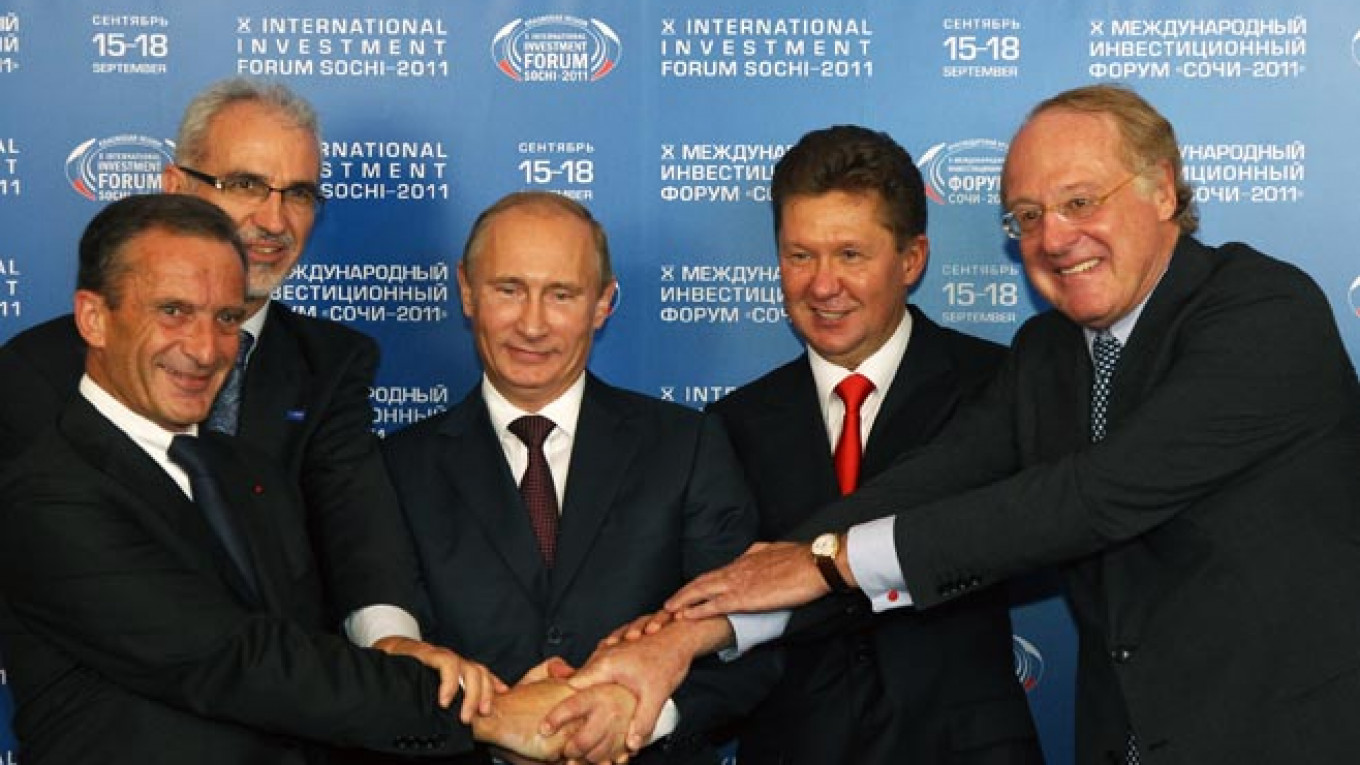While Russia's standoff with the West over Ukraine? may have caused? Italian? energy group? Eni to? distance itself from? the? huge? South Stream gas pipeline? project? linking Russia to Central Europe,? partners from Germany,? which is? highly dependent on Russian gas,? have stayed faithful.
On Friday, German? engineering conglomerate? Siemens, and? South Stream Transport,? a consortium led by Russian state gas firm Gazprom,? signed a contract to supply automatic control systems and telecommunications equipment for the pipeline's onshore control centers, Gazprom said in a statement.
South Stream, which when built will bypass Ukraine by passing under the Black Sea to Bulgaria and through Eastern Europe, aims to meet 15 percent of Europe's gas demand by the end of the decade.
South Stream Transport,? jointly owned by? Gazprom, Italy's Eni, France's? energy giant ? EDF and Germany's? oil and gas exploration company? Wintershall, in March concluded a contract to build the first? line of the South Stream's offshore section, which will be composed of four parallel? lines laid under the Black Sea at a depth of more than 2,000 meters.
Construction of the first? line is to commence in the fall of 2014, ending in 2015. Gazprom plans to begin deliveries of 15 billion cubic meters? of gas per year through the first line in late 2015. The pipeline's full design capacity is projected at 63 billion cubic meters per year, to be reached by 2018.
The fate of the project, however, was? questioned in March when? Eni's CEO Paolo Scaroni called the future of the pipeline "somewhat gloomy."
The statement followed an array of sanctions imposed on Russia by the West over? Russia's annexation of Crimea? from Ukraine.
Scaroni's comments may have been also prompted by? Italy's? own issues with separatist regions.? At the end of March,? 89 percent of voters in? Italy's Veneto region in an unofficial online referendum? supported? independence from the rest of the country. Following the vote, hundreds of pro-independence activists gathered for a demonstration, waving flags of an old Venetian Republic. The protesters said they had been inspired by Scotland and Catalonia, who have also planned referendums for 2014.
Despite Italy's Eni? doubts? over the future of South Stream, another major stakeholder of the project, Germany's Wintershall — owned by? chemicals giant? BASF — has been, on the contrary, supportive of it and of other joint ventures it has in Russia.
Wintershall told German businessmen that they? oppose economic sanctions against Russia.
"Economic sanctions will not help anybody," said Wintershall CEO? Rainer Seele at the company's annual news conference in the German town of Kassel in March.
Besides participating in the South Stream project with Gazprom, Wintershall is also? involved in? the Urengoi gas field in western Siberia and is facilitating further integration of the Nord Stream pipeline, another Russian pipeline supplying? gas to Northern Europe,? with the European network.
Wintershall will invest? four billion euros in expanding? its oil and gas business, concentrating on Russia and Norway, in the next five years, Seele said in Kassel.
With more than a third of its natural gas coming from Russia, Germany is highly dependent on? the country? for supplies.
Another country? that? has been supportive of Russia's gas projects is Bulgaria,? which? is almost entirely dependent on Russian gas.
On Thursday Bulgarian Foreign Minister Kristian Vigenin said in an interview with Reuters that while the country? is considering? other options, gas from Russia remains the only energy source for Bulgaria in the foreseeable future. With no real choice on the agenda, technical studies for the South Stream have not stopped, Vigenin said.
Contact the author at a.panin@imedia.ru


